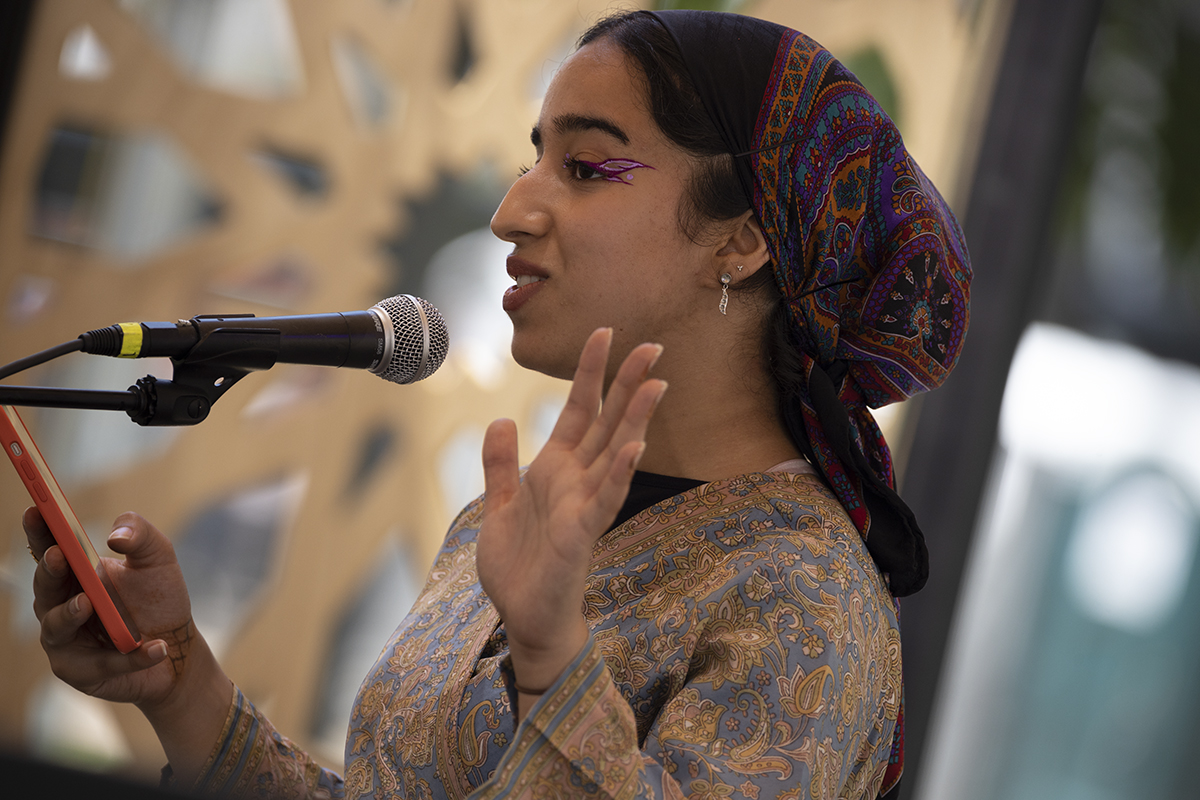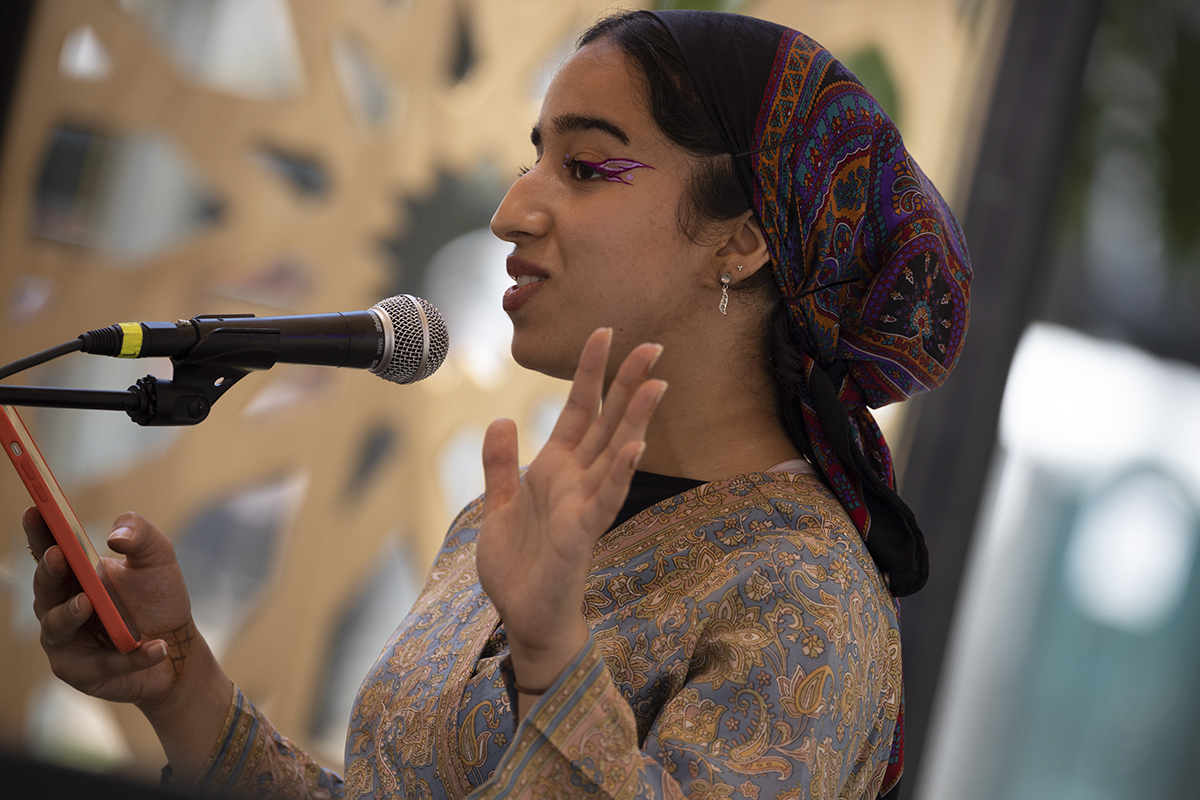[ad_1]

Maitha Al Suwaidi performs on the Crossroads Stage on the 2022 Smithsonian Folklife Competition.
Picture by Phillip Lee, Ralph Rinzler Folklife Archives
“Each poem tells a special expertise, a special a part of me.”
Maitha Al Suwaidi closed a well-worn journal and waved goodbye to the group of Smithsonian Folklife Competition attendees in her writing workshop. In an hour, she would carry out her poetry on the Crossroads Stage, however for the second, she sat down to debate the facility of spoken-word poetry. To Al Suwaidi, spoken phrase isn’t just a software for describing the world however an area to grapple with important questions of id.
“The primary time I wrote poetry was a second of catharsis,” she mentioned. “I simply wanted to write down one thing.”
She discovered that free-verse poetry helps her channel her feelings, unrestricted by a set meter or the structural calls for of prose. In her phrases, “everybody, everybody, everybody” ought to attempt writing poetry—although she understands those that are intimidated by the thought.
“Rising up, poetry sounded so impenetrable,” she remembered. “When somebody says, ‘I’m going to write down a poem,’ it sounds prefer it must be this polished, skilled factor. That must be deconstructed, as a result of poetry belongs to everybody.”
Raised in Sharjah, United Arab Emirates, Al Suwaidi attended New York College Abu Dhabi, the place she first discovered inspiration to share her poetry at an open-mic night time.
“After that have, I felt assured within the course of of continuous to write down and discover poetry,” she mentioned. She had grown inspired by the “stunning sense of intimacy” spoken phrase affords. When a poet reads, the viewers is inspired to hum, snap their fingers, and whoop in appreciation. Due to poetry’s particular capability to translate emotion, forming a deep reference to somebody within the crowd is so simple as one compelling metaphor.
“Narrativizing lived experiences and struggles in inventive methods is one of the simplest ways to achieve individuals,” Al Suwaidi defined. “It’s one of the simplest ways to have others empathize and have others perceive the experiences that you simply undergo.”
At one efficiency, she mentioned, “the group was significantly full of girls, and the poem I learn is about womanhood, about not eager to be belittled and scrutinized by a lover. I bear in mind ending that poem and a girl requested for me to return up and recite the very same poem once more.” Al Suwaidi smiles on the reminiscence. “Listening to so many individuals in that viewers resonated with the poem to the purpose the place they wished to listen to the very same factor once more, actually simply as I learn it—it was actually, actually thrilling.”
Digital camera: Ali Ali, Pruitt Allen, Sujay Khona
Story and Modifying: Ali Ali
Womanhood is a significant theme in Al Suwaidi’s work, together with household, friendship, and journey. She gave one poem the title “Nada,” after her mom. In it, she paints an image of the day she was born, telling the story of how her mom was pressured to call her one thing that will please others. In one other, she describes the expertise of touring as being “between one airplane and one other,” and remembers a second strolling by means of the streets of Korea within the early hours of the morning, marveling that “males didn’t stare.”
Al Suwaidi doesn’t set out with the purpose of sharing her cultural background, however her verses trace on the UAE expertise.
“Whereas these tales are so particular, they let you know that there’s variety and there may be magnificence in particular person and collective lives that individuals dwell within the UAE.”
A part of that magnificence is the multinational, multilingual nature of the nation. A fluent English speaker, Al Suwaidi typically consists of Arabic language in her poetry.
“I grew up oscillating between English and Arabic to elucidate completely different elements of my id and completely different feelings,” she defined throughout a story session of “Language and Identification” on the Folklife Competition. “The identical factor occurs organically after I’m writing. If I’m speaking about religion and spirituality and residential, Arabic inevitably seeps in. If I’m speaking about feelings, which means English goes to be current as nicely.”
When she writes poetry in Arabic, she describes having “house to rhyme and play with alliteration and musical sounds” in ways in which she doesn’t in English. “I can discover a phrase and develop on that phrase or that root phrase with ten different phrases in ten completely different verses.” She explains that Arabic phrases are centered round a three-consonant root, with completely different vowels added to kind associated phrases. For instance, the phrases for data, trainer, scientist, and divine knowledge all share a root.

Picture by Phillip Lee, Ralph Rinzler Folklife Archives
Sooner or later, Al Suwaidi needs to discover extra aspects of her tradition, together with her Persian ancestry.
“My id could be characterised as an Ajami Arab or Ajami Emirati,” she defined within the language panel. “The phrase ajami straight interprets to ‘that which isn’t Arab.’ So in my id and my household historical past, it’s the non-Arab Arab.” As a grasp’s scholar on the College of Oxford’s Blavatnik Faculty of Authorities, Al Suwaidi plans to make use of a tutorial lens to discover this facet of her id.
“I’m selecting to do an autoethnographic work the place I can discuss my household’s experiences, ask to sit down with my dad and mom and grandparents, and simply hear their tales, ask questions, and actually purpose to treasure all of that and doc it,” she shared. From there, she expects “that’s going to open a variety of doorways by way of inventive expression.”
Because the time of Al Suwaidi’s efficiency approached, we began making our approach to the Crossroads Stage to fulfill her fellow UAE poets Mohammed Anis, Dorian Rogers, Danabelle Gutierrez, and Jaysus Zain. As we walked, Al Suwaidi spoke excitedly about her plans for the following day’s poetry workshop.
“Long run, I’d actually like to show,” she mentioned. “Greater than anything, I wish to make poetry one thing that’s accessible for everybody to make use of as a software to develop, heal, and flourish.”
AJ Jolish is a writing intern on the Middle for Folklife and Cultural Heritage. She is a scholar at Scripps Faculty, learning inventive writing and linguistics. Audio recorded and edited by Dave Walker for the Ralph Rinzler Folklife Archives.
[ad_2]
Source link


